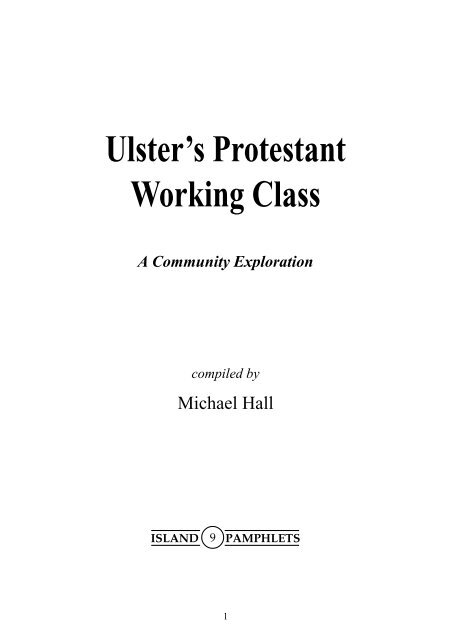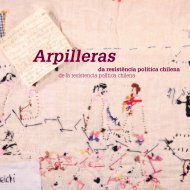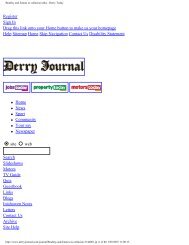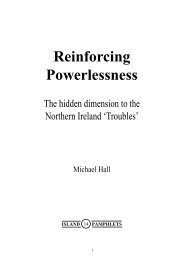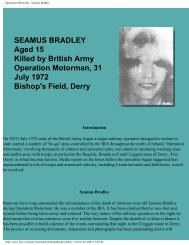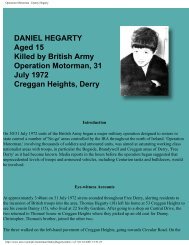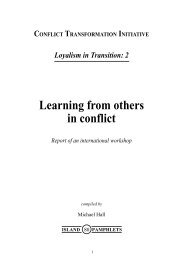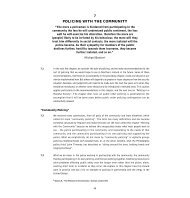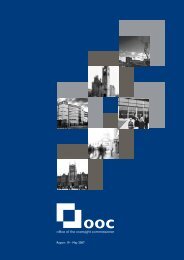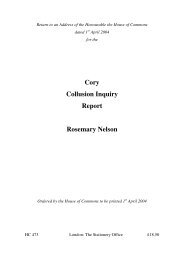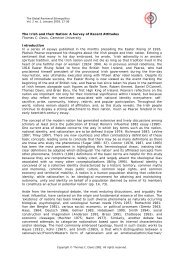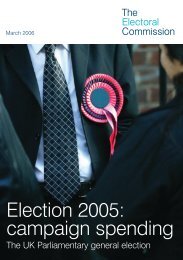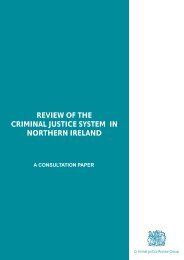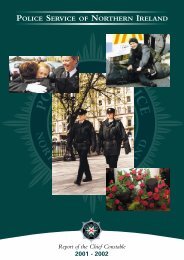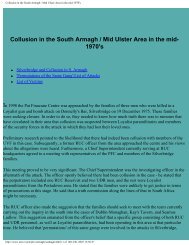Ulster's Protestant Working Class A Community Exploration - CAIN
Ulster's Protestant Working Class A Community Exploration - CAIN
Ulster's Protestant Working Class A Community Exploration - CAIN
You also want an ePaper? Increase the reach of your titles
YUMPU automatically turns print PDFs into web optimized ePapers that Google loves.
Ulster’s <strong>Protestant</strong><br />
<strong>Working</strong> <strong>Class</strong><br />
A <strong>Community</strong> <strong>Exploration</strong><br />
compiled by<br />
Michael Hall<br />
ISLAND<br />
9<br />
PAMPHLETS<br />
1
ISBN 1 899510 00 1<br />
Published 1994 by Island Publications<br />
132 Serpentine Road, Newtownabbey<br />
Co. Antrim BT36 7JQ<br />
Acknowledgements<br />
The Springfield Inter-<strong>Community</strong> Development Project would like to thank the following:<br />
• The Greater Shankill Development Agency for use of its premises by the discussion group.<br />
• The Trustees of Kinder <strong>Community</strong> House for their support.<br />
• The <strong>Community</strong> Relations Council for providing the funding needed to prepare and publish<br />
this document.<br />
• Robin Hall, for the cover artwork.<br />
The discussion group was chaired by Billy Hutchinson and Michael Hall.<br />
Among the main contributors were:<br />
Joy Challis<br />
Sammy Douglas<br />
Roy Garland<br />
Eddie Kinner<br />
Mary McCurrie<br />
Chris McGimpsey<br />
Billy Mitchell<br />
Jackie Redpath<br />
William Smith<br />
Gusty Spence<br />
John White<br />
Printed by Perfect Print, Shankill Road, Belfast<br />
2
Preface<br />
The discussions on which this report is primarily based took place towards the<br />
middle of 1994, and the report itself was completed a few days before the IRA<br />
ceasefire of 1 September. The ceasefire obviously added a significant new<br />
element into the current situation.<br />
However, the ceasefire was only days old when the media began commenting<br />
negatively on the hesitation sections of the <strong>Protestant</strong> community were displaying<br />
towards it, and it was obvious that the events of the last twenty-five years –<br />
which were largely responsible for such hesitation – were in danger of being<br />
seen in isolation from the newly-perceived opportunity for peace. And yet the<br />
present perceptions of both communities in Northern Ireland are very much a<br />
product of those twenty-five years, with each community bearing scars which<br />
will take a long time to heal. Neither community can be expected to sit down<br />
with the other without a fuller understanding of what the ‘Troubles’ have meant<br />
to them.<br />
Therefore, although the discussion group have added a Postscript on the IRA<br />
ceasefire, it was decided to leave the main report intact, for only in this way<br />
could a proper perspective be given of the present reality of the <strong>Protestant</strong><br />
working-class experience.<br />
3
Introduction<br />
In October 1992 the Springfield Inter-<strong>Community</strong> Development Project organised<br />
a conference for community groups working on both sides of the West Belfast<br />
‘peace-line’ interface. Its purpose was to assist these groups to develop a joint<br />
strategy for tackling the common social and economic problems which beset<br />
them. However, this exploratory conference kept its agenda flexible, for it was<br />
realised that before the two estranged communities could begin to co-operate on<br />
socio-economic issues much fear and misunderstanding had to be confronted.<br />
The conference, therefore, allowed the delegates a chance not only to describe<br />
the problems they faced but voice the fears and suspicions held by their respective<br />
communities.<br />
As the conference report 1 clearly revealed, the depth of misunderstanding<br />
between the two communities was dramatically confirmed, with each side<br />
revealing a confused and rudimentary appreciation of the fears and aspirations<br />
held by the other. It was also apparent that even within each community there<br />
was confusion and uncertainty, and the feeling that needs and aspirations had<br />
never been adequately articulated, let alone acknowledged.<br />
The organisers decided that it would be worthwhile to assist each community<br />
begin such a process of articulation. As a first step, a series of meetings was<br />
held on the Shankill Road in the first half of 1994 which sought to explore the<br />
<strong>Protestant</strong> working-class experience. This document is the product of those<br />
discussions.<br />
The Springfield Inter-<strong>Community</strong> Development Project would hope to facilitate<br />
the same process within the Catholic working-class. We believe such explorations<br />
are vital if we are ever to develop genuine inter-communal awareness, something<br />
still lacking after twenty-five years of unremitting violence. Only when our two<br />
communities face each other with honesty and openness, and with a preparedness<br />
to let dialogue replace violence, can we ever hope to transcend our present<br />
tragic circumstances.<br />
Billy Hutchinson<br />
Springfield Inter-<strong>Community</strong> Development Project<br />
August 1994<br />
1<br />
Life on the Interface, Island Pamphlets No 1.<br />
4
Note<br />
A frequent complaint voiced by Northern Ireland’s <strong>Protestant</strong> working class is<br />
that media and government continually view their community in a simplistic<br />
and stereotypical manner, with little attempt made to acknowledge the diversity<br />
of experiences and opinions. As our own discussions were, of practical necessity,<br />
focused within that section of the <strong>Protestant</strong> working class living along Belfast’s<br />
Shankill Road, we wondered whether we might fall into the same trap. For who<br />
could say whether opinions expressed along the Shankill Road necessarily<br />
reflect those of other <strong>Protestant</strong> working-class communities elsewhere throughout<br />
Northern Ireland.<br />
Two things served to lessen our concerns. Firstly, we acknowledged that<br />
when the media and others use the phrase ‘the Shankill and the Falls’ as a<br />
synonym for the two working-class communities within Northern Ireland, it is<br />
not simply for the sake of a convenient label, but because it is believed that the<br />
hopes, fears and aspirations of the people living along both those roads have<br />
indeed come to reflect closely the hopes, fears and aspirations of Northern<br />
Ireland’s two working-class communities in general.<br />
Secondly, we endeavoured to make our discussions as broadly-based as<br />
possible, and invited along individuals who we felt would reflect a wide crosssection<br />
of opinion within the <strong>Protestant</strong> working class. To further extend our<br />
outreach those who attended the meetings were requested to share our deliberations<br />
with their own circle of contacts, and thereby stimulate additional feedback.<br />
The organisers feel reasonably confident, therefore, that the views we managed<br />
to canvas provide us with a broad overview of <strong>Protestant</strong> working-class opinion<br />
– and the wide diversity of opinion expressed during the discussions gave<br />
ample proof of that.<br />
The organisers express their gratitude to those who formed the core of the<br />
discussions, with a further thanks to all those who took the time to forward us<br />
written submissions. The quality of those discussions and the standard of the<br />
written submissions seem to indicate that the days of <strong>Protestant</strong> working-class<br />
inarticulateness are at last hopefully numbered.<br />
Cross-community worker and writer Michael Hall was invited to co-chair the<br />
discussions, and prepare the document which now follows.<br />
5
Ulster’s <strong>Protestant</strong> <strong>Working</strong> <strong>Class</strong><br />
Acknowledging a Crisis . . .<br />
A <strong>Community</strong> <strong>Exploration</strong><br />
The initial belief that there was a pressing need for this series of discussions<br />
was very soon confirmed. The early opinions and comments expressed, both<br />
within the discussion group and outside, gave ample indication that the <strong>Protestant</strong><br />
working class is presently undergoing a period of unprecedented transition,<br />
which almost warrants the label of crisis.<br />
This crisis has engendered many different reactions within the <strong>Protestant</strong><br />
working-class community: a numbing sense of bewilderment, an increasing<br />
feeling of demoralisation, not to mention a deep resentment and bitterness.<br />
Amidst these disparate reactions there are some common threads. There is the<br />
belief that over the last twenty-five years the <strong>Protestant</strong> working class has<br />
become increasingly isolated and marginalised. Its members feel that their<br />
deeply-held aspirations have rarely been acknowledged as legitimate by outsiders.<br />
Their ‘case’ has either been denigrated or ignored, or misrepresented by the<br />
media and government. Indeed, the media is felt to have been fixated with the<br />
cause of Irish Republicanism to the point of remaining oblivious to any suggestion<br />
that the heritage defended by Ulster’s <strong>Protestant</strong> community could be every bit<br />
as valid.<br />
The <strong>Protestant</strong> working class and its organisations are frequently viewed, and<br />
presented, as being largely composed of bigoted reactionaries, whose prime<br />
motivation is to prevent the Catholic community from gaining any advantage.<br />
Such a perception ignores the fact that some of the most progressive proposals<br />
to have emerged over recent years have come from <strong>Protestant</strong> working-class<br />
organisations. 2<br />
Many feel that the suffering inflicted upon, and often deliberately directed<br />
against, the <strong>Protestant</strong> community by the IRA has never been fully acknowledged.<br />
Nor have the social and economic needs of the <strong>Protestant</strong> working class been<br />
adequately addressed.<br />
2<br />
For example: Beyond the Religious Divide, New Ulster Political Research Group, 1979; Common<br />
Sense, John McMichael, Ulster Defence Association, 1987; Sharing Responsibility in Northern<br />
Ireland, Policy Document, Progressive Unionist Party of Northern Ireland, 1991; The Ulster<br />
Volunteer Force: its negotiating history, dissertation by Roy Garland, 1994, copies of which are<br />
available in Belfast Central and Linen Hall Libraries.<br />
6
Ironically, despite the high profile and vociferousness of many Unionist<br />
politicians, a frequent complaint from the <strong>Protestant</strong> working class is a feeling<br />
of being ‘leaderless’. These politicians might be staunch in defence of the<br />
Union, but in the opinion of many working-class <strong>Protestant</strong>s they show little<br />
willingness to lead their constituents anywhere beyond ‘Ulster Says No’ and<br />
into a new future.<br />
1 – The Crisis of Identity<br />
One of the most traumatic consequences of the past twenty-five years for the<br />
<strong>Protestant</strong> working class has been its crisis of identity. Despite the intensity of<br />
IRA violence, the Republican onslaught has not been the main cause of this<br />
crisis – after all, the IRA was always considered a ‘known’ enemy, suspected<br />
by many <strong>Protestant</strong>s of waiting in the wings, ready to seize any opportunity to<br />
renew its habitual assault upon the Northern Ireland state. Instead, it is the<br />
British government which has been primarily responsible for the deep trauma<br />
within the <strong>Protestant</strong> psyche, for its actions have engendered an increasing<br />
sense of betrayal, which twenty-five years on has led to the almost total<br />
estrangement of <strong>Protestant</strong> Ulster 3 from ‘mother’ England. Most working-class<br />
Loyalists now believe that their loyalty counts for little on the mainland –<br />
Britain no longer wants them.<br />
What exactly is it that Ulster Loyalists are ‘loyal’ to? And what is the identity<br />
so dearly held by Ulster’s <strong>Protestant</strong>s? Ironically, the assertion made by their<br />
detractors that this identity is at best a hybrid one or at worst a false consciousness<br />
fabricated by the ‘Brits’, often seems to be confirmed by the confusion and<br />
uncertainty acknowledged by <strong>Protestant</strong>s themselves.<br />
We always loudly proclaimed that ‘we are the people’. But just what<br />
‘people’ are we – British, Irish, Northern Irish, Ulster-Scots? The young<br />
people I work with often only seem able to define themselves in opposition<br />
3<br />
Loyalist use of the term ‘Ulster’ to describe Northern Ireland is anathema to most Irish nationalists,<br />
who prefer to call this ‘British invention’ the ‘Six Counties’, in recognition of the three remaining<br />
Ulster counties incorporated into the Republic of Ireland. Ironically, the 9-county configuration<br />
staunch nationalists deem to be ‘historic Ulster’ – and which includes Donegal, Monaghan and<br />
Cavan – is itself a ‘British invention’. For even up to the Anglo-Irish and Gaelic lordships of the<br />
early 16th century, ‘Ulster’ contained territory presently in Co Louth rather than Co Cavan, and it<br />
was Queen Elizabeth’s administrators who subsequently redefined the province’s boundaries. See<br />
A New History of Ireland, ed. Moody, Martin and Byrne, vol. IX: ‘Maps, Genealogies, Lists’, map<br />
47, Oxford, 1984.<br />
7
to others – they don’t know fully what they are, but they know exactly<br />
what they’re not! *<br />
Some place the blame for this situation on the education system:<br />
Our schools never made any serious attempt to help us understand our<br />
real heritage. Apart from 1690 and 1921, what did we ever learn about the<br />
history of our own homeland? We got plenty of English history drummed<br />
into us – but next to nothing about Ulster.<br />
Such avoidance by the schools was to leave most <strong>Protestant</strong>s ill-prepared to<br />
counter what they considered to be the biased version of Ulster’s history<br />
invariably incorporated into every TV documentary on the ‘Troubles’.<br />
We knew full well that the media were short-changing us when it came to<br />
presenting our side of the story, but what was our side of the story? We<br />
couldn’t even explain it properly ourselves. And that’s still the same.<br />
There’s been plenty of times people around here have refused to take part<br />
in cross-community meetings, not because we don’t want to sit down with<br />
Catholics, but because we don’t have the self-confidence to do so. Few of<br />
us can articulate our case the way they can theirs.<br />
‘They’ – the Catholic community – are often begrudgingly acknowledged to<br />
‘know their history inside out’.<br />
Let’s face it – the Republicans have really got their act together, especially<br />
their ‘Irish heritage’. It has given them a sense of purpose which has<br />
sustained them through times of adversity. They’ve done a thorough job<br />
of it, so fair play to them, that’s all I can say. But us? Oh no – we stumble<br />
from crisis to crisis, and even though we possess an equally legitimate<br />
heritage, at times it seems no bloody use to us. It’s high time we got our<br />
act together.<br />
In substance the Ulster <strong>Protestant</strong> heritage is an amalgamation of certain<br />
diverse strands: religious affiliation, a ‘British’ consciousness, an almost ‘ethnic’<br />
sense of group identification, a genuinely-held sense of ‘belonging’ to Ulster,<br />
and, for the working class, the reality of their social and economic circumstances.<br />
Yet none of these strands by itself necessarily explains why Ulster’s <strong>Protestant</strong>s<br />
should feel so different from the rest of the island, and to some extent their<br />
sense of difference has been partly reinforced because others also perceive<br />
them as ‘different’.<br />
Religious affiliation need not necessarily have resulted in <strong>Protestant</strong>ism being<br />
* The quotes throughout this document come from three sources: opinions expressed during the main<br />
discussions; outside comments made to members of the discussion group and relayed back; and,<br />
finally, the various documents which were submitted to the group.<br />
8
so seemingly incompatible to the concept of ‘Irishness’. Indeed, <strong>Protestant</strong>s<br />
have been to the forefront in the development of all things Irish, even the birth<br />
of Republicanism. Yet Daniel O’Connell, within five years of achieving Catholic<br />
Emancipation, stated that <strong>Protestant</strong>s were “foreigners to us since they are of a<br />
different religion”, 4 and in more recent times De Valera claimed that “since the<br />
coming of Saint Patrick... Ireland has been a Christian and a Catholic nation...<br />
She remains a Catholic nation.” 5 Somehow the <strong>Protestant</strong>s of Ireland ceased to<br />
figure in the ‘Irish’ consciousness, and their contribution to this island’s heritage<br />
was conveniently ignored.<br />
Not that this has troubled many <strong>Protestant</strong>s, for whom any such contribution<br />
made by their forefathers was an aberration, even traitorous.<br />
I remember taking a group of Shankill Road teenagers to the old cemetery<br />
at the bottom of the Antrim Road, and I pointed out where the bones of<br />
Henry Joy McCracken are believed to have been interred. I told the young<br />
people that this was the grave of a famous Belfast <strong>Protestant</strong> hanged by<br />
the British. ‘What had he done?’ one asked, quite sympathetic in tone, for<br />
there was nothing unusual about <strong>Protestant</strong>s finding themselves in conflict<br />
with the Crown. ‘He was one of the founders of Irish Republicanism,’ I<br />
replied. A look of complete disdain came over the teenager: ‘Served the<br />
bastard right, then!’<br />
Many <strong>Protestant</strong>s would feel in full accord with such disdain:<br />
The Unionist Loyalist population have no wish to take any pride in Irish<br />
things, but rather should be urged and educated to take pride in Ulster<br />
things.<br />
Nevertheless, a growing number believe that this approach actually diminishes<br />
their <strong>Protestant</strong> heritage.<br />
Witness the role and influence of radical <strong>Protestant</strong>s in Ireland: Grattan’s<br />
parliament; the Volunteer Movement; Ulster Tenants Right; Linenhall Library;<br />
Belfast called the ‘Athens of the North’; Young Ireland (led by sons of the<br />
Presbyterian manse); Armour of Ballymoney; William Orr of Farranslane;<br />
James Orr of Ballycarry; Samuel Neilson of Belfast; Molly Ward’s Tavern;<br />
Mary Ann McCracken and the Charitable Institute; Volunteers’ Guard of<br />
Honour at the opening of the first Catholic Chapel in Belfast; industrial<br />
Ulster was built by radical <strong>Protestant</strong>s (not by right wing sectarian<br />
demagogues); birth of historic Republicanism; the Irish language and music<br />
were kept alive by <strong>Protestant</strong> poets, musicians and artists.<br />
Of course, when we refer to ‘<strong>Protestant</strong>s’ we have to be mindful that for many<br />
an acceptance of this label has more to do with all the ingredients which make<br />
4<br />
Parl. Deb. III, xv, 325; Pilot 13-i, 1834.<br />
5<br />
Radio broadcast, St Patrick’s Day, 1935.<br />
9
up their identity, not necessarily the practice of religion – and the dwindling<br />
attendance at many <strong>Protestant</strong> churches is testimony to that.<br />
Nevertheless, for a significant number of <strong>Protestant</strong>s the religious component<br />
of their identity is the fundamental one. Some insist that the continuing conflict<br />
between <strong>Protestant</strong>ism and Catholicism in Ireland is historically inevitable:<br />
The Pope is still the anti-Christ and all <strong>Protestant</strong>s should be made aware<br />
of this. No apology is offered for this statement – it is backed up by<br />
biblical truth. The guiding hand of Rome is still with us. The Roman<br />
Catholic church supported the 1641 <strong>Protestant</strong> holocaust and gives its<br />
support to the slaughter of today – how many terrorists has it<br />
excommunicated? We have every reason to fear the Church of Rome, for<br />
if they had their way we would be back in the Dark Ages.<br />
However, many religious <strong>Protestant</strong>s feel that to portray <strong>Protestant</strong>ism in<br />
such stark ‘conflict’ terms only serves to reinforce its image of being anti-<br />
Catholic, rather than non-Catholic. <strong>Protestant</strong>ism, they feel, must be viewed in<br />
a much broader perspective.<br />
The term <strong>Protestant</strong> stems from the Latin pro and testari which means ‘to<br />
bear witness’. It is not, therefore, a negative protest but a positive one.<br />
<strong>Protestant</strong>ism is not necessarily anti-Catholic. Presbyterianism has protested<br />
against Anglican oppression; Congregationalism has protested against<br />
Presbyterian theocracy; non-subscribing Presbyterians have protested against<br />
Confessional Presbyterians. The process of socio-religious evolution has<br />
constantly defined and redefined the nature of <strong>Protestant</strong>ism and, particularly<br />
in Ulster, it came to stand for religious and political dissent.<br />
Others feel that the Northern Ireland conflict has tended to reduce their<br />
religion to a narrow stereotype, shorn of its rich diversity.<br />
I believe that there are certain important elements within our <strong>Protestant</strong><br />
tradition which have been forgotten by many people. I grew up with a<br />
pride in the emphasis upon the right of private judgement, of the basic<br />
equality between all people, and a respect for truth even when it might be<br />
considered inconvenient. My sense of being <strong>Protestant</strong> was not related to<br />
being part of any ascendancy. I feel that pettiness and sectarianism has<br />
undermined our <strong>Protestant</strong> heritage, as well as certain attitudes displayed<br />
by <strong>Protestant</strong> leaders towards Catholics. For example, for <strong>Protestant</strong>s to<br />
profess a commitment to ‘civil and religious liberty for all’ and then<br />
attempt to deny civil rights to others, as was done in 1969, was hypocritical.<br />
For me the real <strong>Protestant</strong> tradition is open, tolerant and accommodating.<br />
Perhaps the Civil Rights issue highlights the complexity of the matter. When<br />
<strong>Protestant</strong> leaders opposed the Civil Rights marches, was it simply their<br />
<strong>Protestant</strong>ism they felt was under threat, or the political system in which<br />
10
<strong>Protestant</strong>s had invested all the diverse components that went to make up their<br />
heritage, in particular their sense of ‘Britishness’?<br />
Many simplistic notions abound as to what it means for Ulster <strong>Protestant</strong>s to<br />
feel British, some often amusing:<br />
Many years ago I walked into a bookies to find two mates of mine arguing<br />
over whether or not Australia was a British Dominion, and when I confirmed<br />
it was, one says to the other: ‘I told you we owned Australia’. And him<br />
with the backside hanging out of his trousers, who must have ‘owned’<br />
next to nothing!<br />
Most working-class <strong>Protestant</strong>s, however, would readily accept that being<br />
‘British’ did not necessarily mean ‘material’ advantage – far from it – it was<br />
more the sense of pride they gained by being part of all those things which<br />
comprised ‘Britishness’ – the democratic ideals, the great institutions, the<br />
culture, the English language, the world-wide renown and prestige, the Empire,<br />
the monarchy. Many of these components, from the perspective of today’s<br />
world, might now be somewhat tarnished, but the idea of a ‘British way of life’<br />
is still a positive concept to many people, whatever its critics might say. For<br />
Ulster’s <strong>Protestant</strong>s in particular all these aspects of ‘Britishness’ are very real<br />
to them, and the cause of much pride. If one complements that with the numerous<br />
population movements between the two islands throughout our history then the<br />
consolidation of a close relationship with mainland Britain would, in any<br />
normal circumstances, only seem perfectly natural.<br />
Indeed, some claim, with a deliberate irony, that the problem does not really<br />
lie with Ulster’s <strong>Protestant</strong>s trying to convince themselves that they possess a<br />
British heritage, but with the rest of Ireland trying to pretend that they do not.<br />
What’s so wrong with being a part of ‘British’ history? Republicans<br />
continually harp on about 800 years of oppression, and if they want to<br />
remain fixated on that, that’s up to them. But name me a world power that<br />
hasn’t been guilty of oppression at one time or another. It hasn’t all been<br />
negative. Whether Irish nationalists like it or not, the richness of Ireland’s<br />
heritage owes plenty to its ‘British’ connections, from the arrival of Saint<br />
Patrick to the contribution made to Irish literature by the great Anglo-<br />
Irish writers. Look, the day after Nelson Mandela became president of<br />
South Africa he announced he was re-applying for admission to the<br />
British Commonwealth. Now his people knew full well what it was like<br />
to suffer at the hands of white Europeans, Brits included, yet he still saw<br />
something valuable in renewing links with this unique British family of<br />
peoples. People claim Ulster <strong>Protestant</strong>s are narrow-minded. I think Irish<br />
nationalists are equally so. It is time they grew out of their hatred of<br />
everything British and acknowledged all the positive things.<br />
11
Even if Irish Republicans do not care to acknowledge these ‘hidden’ aspects<br />
of their own heritage, <strong>Protestant</strong>s feel it is high time Republicans at least began<br />
to acknowledge something which is only too visible to everyone else:<br />
Sooner or later the Republican movement has to accept that the real<br />
‘British presence’ in Ireland is not the few thousand British soldiers here,<br />
but the one million <strong>Protestant</strong>s – and God knows how many Catholics –<br />
who feel they have a British heritage.<br />
However, the bedrock of the heritage of Ulster <strong>Protestant</strong>s is their deeply-held<br />
belief that they belong here. They are as attached to their corner of the world as<br />
any people anywhere. Irish Nationalists often try to portray <strong>Protestant</strong>s as<br />
interlopers who came over with the Plantation, and even talk as if this Plantation<br />
was a recent historical event. Few would make such a claim against present-day<br />
Americans, and yet only two years separate the Plantation of Ulster and the first<br />
permanent British settlement in North America (Jamestown, Virginia).<br />
There is no denying that past events in Irish history still retain their potency<br />
within the communal consciousness of today’s estranged communities, and<br />
both sides can readily cite ancient grievances – such as Cromwell’s massacre of<br />
Catholics on the one hand, and the 1641 massacre of <strong>Protestant</strong>s on the other.<br />
However, some within the <strong>Protestant</strong> community now feel that a stop must be<br />
made to this ‘history roundabout’ and a thorough reassessment begun.<br />
It’s time we began to look more honestly at where we have come from and<br />
where we are going. It’s time we looked anew at Irish culture, British<br />
culture, Orangeism. . . all of it. . . everything. Without trying to belittle<br />
any of it. Let’s look at it with today’s needs in mind, not with a vengeful<br />
eye on the past. Prods have to get away from this notion that if you<br />
question anything you’re being disloyal. That’s nonsense.<br />
While many <strong>Protestant</strong>s might have some difficulty articulating the ingredients<br />
which make up their sense of ‘belonging to Ulster’, few observers could doubt<br />
its reality, particularly as exhibited by the working class.<br />
A prominent Unionist politician recently said – in private conversation –<br />
that in the event of a United Ireland he would simply leave. But we can’t<br />
just up and leave, that’s not an option for ordinary people. And, anyway,<br />
we wouldn’t want to: this is our country and nobody’s going to move us!<br />
A somewhat narrower sense of belonging within the <strong>Protestant</strong> working class<br />
is also evident in territorial rivalries: Upper Shankill v. Lower Shankill; Sandy<br />
Row v. The ‘Pass’; West Belfast v. East Belfast; urban v. rural... Family<br />
networks and community allegiances play an important part in <strong>Protestant</strong> workingclass<br />
life, and the dismantling of old communities and the subsequent move to<br />
suburban estates has often compounded the demoralisation brought on by the<br />
Troubles.<br />
12
2 – The <strong>Working</strong>-<strong>Class</strong> Experience<br />
Although the <strong>Protestant</strong> working class is seen by many to be the mainstay of<br />
Ulster Loyalism, a fundamental component of its own self-identity is undoubtedly<br />
the working-class experience. The cumulative legacy of working-class life<br />
through the generations has forged strong bonds within local communities,<br />
supportive for many, claustrophobic perhaps for others. And while the ‘work<br />
ethic’ label often applied to the <strong>Protestant</strong> community is now being challenged,<br />
there is no doubt that prior to the Troubles people within the <strong>Protestant</strong> working<br />
class did work hard and believed it important to be industrious, for along with<br />
this came a sense of pride even amidst conditions of poverty.<br />
The ‘work ethic’ label even had a cultural dimension, with the notion that the<br />
‘Planters’ were an industrious stock of people who transformed the Ulster<br />
landscape, whereas the ‘natives’ were lazy. This had been translated in modern<br />
times into the perception that the Catholic community was quite content to live<br />
on welfare benefits while ‘doing the double’, and that Catholic poverty was a<br />
reflection of their social and religious attitudes. One result of such perceptions<br />
was that a ‘blind eye’ could be turned towards genuine social injustices suffered<br />
by the Catholic community.<br />
But what of the social injustices experienced by the <strong>Protestant</strong> working<br />
class? The reality of their daily lives left them little escape from the problems<br />
faced by working-class communities anywhere: poorer education, poorer health,<br />
more frequent unemployment, a feeling of being dependent, of having limited<br />
control over circumstances, a lack of confidence and a squandering of talent.<br />
And, Nationalist propaganda notwithstanding, this deprivation was little ameliorated<br />
by their allegiance to the ruling Unionist establishment.<br />
Republicans have long promoted the notion that the <strong>Protestant</strong> community<br />
was much better off than the Catholic community. This ‘half-myth’ retained<br />
its potency because <strong>Protestant</strong>s even believed it themselves. The reality<br />
was that whatever privileges the <strong>Protestant</strong> working class was granted<br />
were merely ‘crumbs from the table’ – it simply suited certain people to<br />
tell us that these crumbs had to be held on to at all costs.<br />
In the past the dilemma for the <strong>Protestant</strong> working class was that to highlight<br />
social inequalities carried political risk. It was believed that any criticism of<br />
government policies would be detrimental to the Northern Ireland state and<br />
simply play into the hands of Republicans. The Unionist establishment expertly<br />
avoided any need to tackle inequality by playing on this fear. That social<br />
13
inequalities were nevertheless very real to ordinary <strong>Protestant</strong>s is revealed by<br />
how few now shed tears for the old Stormont.<br />
There was a terrible feeling of betrayal when Stormont was swept aside,<br />
but now that it has gone it is time working-class Prods admitted that,<br />
other than the mistaken notion that it was somehow defending our interests,<br />
we got precious little from it – our lives were hardly a bed of roses. If a<br />
devolved administration ever returns we must make it perfectly clear that<br />
we don’t want one like the old one – that would be totally unacceptable.<br />
The present Troubles have released many dormant frustrations:<br />
Our Unionist politicians and church leaders never showed the slightest<br />
concern for the ‘benefit rights’ of ordinary Prods. Even at the beginning<br />
of the ‘Troubles’ the only ones offering welfare advice to working-class<br />
people were a few Catholic priests – and I know, because I had to go to<br />
one of them.<br />
While in Great Britain such social needs might have resulted in a sizeable<br />
labour vote, in Northern Ireland the stance taken by the British Labour Party to<br />
a United Ireland has seriously undermined whatever appeal a labour party<br />
might have among working-class <strong>Protestant</strong>s. Despite the existence of independent<br />
labour candidates, the mood at present is still largely to support the main<br />
Unionist parties – but not as unconditionally as before.<br />
All a Unionist candidate had to do was appear at a street-corner, wave the<br />
Union Jack, shout ‘This we will maintain’, and he was as good as elected.<br />
Those days have to be brought to an end. It’s time we called our<br />
politicians to account for failing to address our real needs.<br />
Although many voices within the <strong>Protestant</strong> working class are becoming<br />
increasingly vociferous in such demands, the task facing them is immense. For<br />
the <strong>Protestant</strong> working class has been demoralised on two fronts simultaneously.<br />
The Troubles – which forced <strong>Protestant</strong>s into cultural and political retreat –<br />
have coincided with the massive erosion of the industrial base which had<br />
provided them with their economic security. 6 Put simply, many of the <strong>Protestant</strong><br />
working class are no longer ‘working’ class.<br />
The demoralisation this has engendered is very real, for much communal and<br />
individual self-worth accrued to industrial skills, even to the detriment of other<br />
avenues of advancement. Further education, for example, was seen as a second-<br />
6<br />
The workforce at Belfast Shipyard, for example, has plummeted from its peak of 42,000 to just<br />
2,000; Mackies Engineering Foundry has dropped from 7,500 to 390. Many major outside<br />
companies with local plants have since departed Northern Ireland: I.C.I., Courtaulds, British<br />
Enkalon, G.E.C., Goodyear, Michelen. The collapse of the linen industry saw the closure of<br />
numerous mills. Decline or demise has hit other major employing sectors: Gallaghers, the<br />
Ropeworks, the stevedores at the docks . . . Small businesses in the Greater Shankill area, once<br />
numbering over 600 before redevelopment, now only total 127.<br />
14
est option to getting into a trade, and attitudes to education are still highly<br />
ambivalent. In the past, children who could have gone on to secondary education<br />
often did not do so simply because their parents could not afford the uniform;<br />
nowadays the same talented children miss out on higher education opportunities<br />
as much because the social conditioning of their parents’ attitudes has prevented<br />
such opportunities being viewed positively. The current scarcity of job<br />
opportunities, coupled with the poor achievement record of many schools in<br />
<strong>Protestant</strong> working-class areas, means that working-class youth are badly losing<br />
out on both fronts. 7<br />
The loss of a working-class identity is the hidden component of the present<br />
crisis, and inevitably has a bearing on political perceptions.<br />
The IRA have been targeting economic targets here for years, but they<br />
haven’t done as good a job as Thatcher and her cronies did across the<br />
water. Where is Britain’s industrial might now, which we were all so<br />
proud to be a part of? We know that the British don’t care tuppence for<br />
us, but sure they don’t even care about their own people – half of England<br />
has become an industrial wasteland. When I watch the Tories on the box I<br />
ask myself – do I really want to be loyal to yon crowd?<br />
The opinion of many within the <strong>Protestant</strong> working class is that the adverse<br />
socio-economic circumstances confronting them have been ignored by everyone<br />
(except when it suits): the <strong>Protestant</strong> middle class, the media, the government,<br />
the politicians. The remarkable growth of community organisations over the<br />
past twenty-five years is a sign that ordinary people realise they have to<br />
confront their social and economic circumstances themselves.<br />
Nevertheless, the balance of power is weighed heavily against them. And<br />
although the decision-making processes are remote from working-class hands,<br />
Catholic as much as <strong>Protestant</strong>, present antagonisms blur such a realisation:<br />
We get nothing for our areas, all the bloody grants go to the Catholics.<br />
One moan from them and they get whatever they want!<br />
<strong>Community</strong> workers see the inherent dangers in such a perception.<br />
We need to stop comparing the two working-class communities in this<br />
way. Perhaps rather than talk of either side being preferentially discriminated<br />
against, we should talk of both communities being equally disadvantaged<br />
as working class. Take the ‘equal opportunities’ issue. I accept that to<br />
allocate jobs on the basis of religion is wrong, but I would imagine that<br />
7<br />
In 1986/87 in the Greater Shankill area only 4% of primary school children passed the ‘11 plus’<br />
examination, when the Northern Ireland average was 21%. In 1987/88 the total number of children<br />
in the Greater Shankill area who passed was 11; in 1988/89 it was 13. In 1992 37% of secondary<br />
school children did not gain any GCSEs. In 1992 no secondary school pupils went on to Higher<br />
Education from Greater Shankill schools. (Further analysis of educational and social deprivation<br />
is contained in the Greater Shankill Regeneration Strategy Consultation Report.)<br />
15
there are far more job opportunities denied to ordinary working-class<br />
people simply because their home address contains the word ‘Shankill’ or<br />
‘Falls’. To concentrate on religious or sex discrimination is to ignore<br />
another, far more fundamental inequality.<br />
There is no doubt that the political situation and the economic downturn are<br />
combining to reinforce the demoralisation and lack of self-esteem that is growing<br />
daily within the <strong>Protestant</strong> working class, and augurs ill for the future.<br />
3 – The Impact of the ‘Troubles’<br />
The Troubles have had a profound impact upon both working classes, not the<br />
least because the death and destruction which has ensued has disproportionately<br />
affected their communities. Within the <strong>Protestant</strong> community opinion about the<br />
root causes is still mixed:<br />
The biggest mistake the Prods made was not to join in the Civil Rights<br />
marches. And even though we didn’t, we shouldn’t have tried to justify<br />
malpractices. We must accept that we were more than aware of the<br />
abuses of power which went on in the past; they might not have been done<br />
by us, but they were supposedly done for us, and we were only too<br />
prepared to keep quiet about them. It was inevitable that some sort of<br />
crisis would erupt – whether we like to admit it or not, Northern Ireland<br />
was a sick society.<br />
Others remain far more cynical:<br />
People imagine that Civil Rights was all about reform. Nobody should be<br />
fooled by that. Nationalists and Republicans don’t want to reform Northern<br />
Ireland, they want to destroy it! We could be the most progressive state in<br />
the world and the IRA would still be trying to bomb us out of existence.<br />
Even those who accept that there were legitimate grievances feel deeply<br />
embittered at how the situation progressed:<br />
Okay, we stupidly fought the Civil Rights people every inch of the way,<br />
but their demands were eventually all met – they got everything they<br />
asked for. 8 If Catholics had been prepared to take one step at a time we<br />
8<br />
On 30.08.88 the Irish News catalogued some of the Civil Rights gains: “The establishment of the<br />
Housing Executive ended for ever the disgraceful policy of discrimination which had fuelled the<br />
Dungannon march. The re-introduction of PR and the abolition of gerrymandering ensured a fair<br />
system of representation in all areas. The setting up of the Fair Employment Agency and recent<br />
steps to strengthen its powers have made discrimination a much more difficult process. And, largely<br />
as a result of the Civil Rights challenge, Stormont itself has gone for ever.”<br />
16
would have had to reach some accommodation with them, but no, nothing<br />
was ever good enough, and their insatiable demands and the ‘all or<br />
nothing’ of the IRA has just bred a deep resentment and anger.<br />
There is now widespread cynicism about Nationalist and Republican motivations:<br />
It’s a bloody laugh to suggest Republicans ever gave a damn about civil<br />
rights! They followed a policy of non-participation then accused the state<br />
of not including them. They always asked for more than could be given<br />
then accused the state of discriminating against them. They used their<br />
own narrow nationalism as a reason to murder yet accused the state of<br />
being bigoted and sectarian. They spread half-truths all over the world<br />
about the state they profess to hate, while willingly accepting all its<br />
monetary benefits. Despite claiming to be fighting for freedom, all their<br />
gains have been made by using bombs, guns, murder and terror – not by<br />
any sound political policies. But it has all been counter-productive. For<br />
I’ll tell you what they have done – in their obsession with destroying a<br />
single geographical border, the IRA have succeeded in creating a thousand<br />
more borders in the minds of our people.<br />
However, whatever the differing perceptions about the Civil Rights question,<br />
twenty-five years on they seemingly bear little relation to the motivations of<br />
today.<br />
We have a whole new generation queuing up to join the paramilitaries.<br />
They haven’t a notion how it all started, and most of them couldn’t care<br />
less. Civil Rights is ancient history to them. They just see a hated enemy<br />
out to destroy them and they want to fight back. I agree with them –<br />
whatever those wrongs were they don’t justify all the IRA killings.<br />
The legacy of over 3,000 deaths has also added its own stark reality to our<br />
two communities, which, for those who have suffered, transcends whatever<br />
history had gone before.<br />
My father was murdered twenty-four years ago by the IRA. He was not a<br />
member of the security forces, nor did he work for them, nor was he in<br />
any paramilitary organisation. He was a labourer at the coal quay, whose<br />
only concern was to support his family – a wife, four children and a baby<br />
on the way. He was an ordinary <strong>Protestant</strong>, presumably one of those<br />
‘ordinary <strong>Protestant</strong>s’ Gerry Adams tells us have nothing to fear. Yet the<br />
IRA left him bleeding to death in the street. In destroying our family Sinn<br />
Féin/IRA taught me all I need to know about their ‘peace process’.<br />
When, at the beginning of the Troubles, the <strong>Protestant</strong> working class felt the<br />
full weight of British army heavy-handedness, few in the <strong>Protestant</strong> establishment<br />
wanted to acknowledge what was happening. It was only those at the receiving<br />
end, especially those sent to prison, who began, for the first time, to experience<br />
17
the British Army the same way Republicans had always done. Yet the testimony<br />
of these Loyalists was frequently ignored or played down by Unionist politicians:<br />
The army grabbed me one day and split my head wide open. They left me<br />
lying at the side of the road – probably thought I was dead. Yet when I tried<br />
to get our local politicians to hold a press-conference, they squirmed away<br />
from such an idea – it would only help Republican propaganda, they said.<br />
The Troubles have also profoundly affected the relationship between the<br />
<strong>Protestant</strong> working class and the police. Admittedly the fact that <strong>Protestant</strong>s<br />
once felt that the police were ‘their’ police was just the reverse side of the coin<br />
by which the Catholic community felt they were definitely not theirs. However,<br />
in their efforts to become more ‘professional’ and ‘acceptable’ to the two<br />
communities the police have in reality become ever more distant from both<br />
working classes. The police increasingly live in their own enclaves away from<br />
working-class areas, and often view working-class citizens as (in their own<br />
words) ‘peasants’ or ‘them’. One aspect of this is the increased harassment<br />
displayed towards working-class youth with the resultant diminution in community<br />
respect.<br />
Some negative aspects of the past 25 years are a consequence of international<br />
trends rather than anything uniquely local – the increase in vandalism, youth<br />
alienation, drug abuse, family breakdown and sexual abuse, as well as the<br />
decrease in respect shown to the elderly. While it is possible that some of these<br />
things may formerly have been largely hidden, there nevertheless remains the<br />
strong conviction that the Troubles have accelerated the process through which<br />
positive community values have greatly suffered.<br />
4 – The Problem of Sectarianism<br />
Sectarianism is the single most destructive element associated with the <strong>Protestant</strong><br />
community, not only because of the damage it does to the image of that<br />
community in the eyes of outsiders, but because of the more insidious damage it<br />
causes within. Yet, while many <strong>Protestant</strong>s undoubtedly harbour sectarian feelings,<br />
some of them extremely bitter, there is a growing number who acknowledge<br />
that such feelings are unacceptable.<br />
Sectarianism, in its most innocuous dictionary meaning, simply denotes<br />
“adherence to a particular sect”. The <strong>Protestant</strong> emphasis on individual choice<br />
has amply manifested itself in Northern Ireland, with a plethora of competing<br />
‘sects’ and churches. Even in the Greater Shankill area there are twenty-three<br />
different denominations.<br />
18
Is it any wonder that Prods cannot speak with one voice? I tried to get the<br />
churches on the Shankill to co-operate on a community festival, and gave<br />
up in frustration. There were too many personalities, too many competing<br />
interests, and I was left feeling they really had no heart in working<br />
together.<br />
Even in class terms <strong>Protestant</strong> churches can be discriminating:<br />
Many of the mission halls and smaller churches sprang up to answer the<br />
needs of ordinary people – those who hadn’t the ‘proper’ clothes, or who<br />
lacked the ‘proper’ social graces to be welcomed into the big <strong>Protestant</strong><br />
churches, dominated by middle-class attitudes. The fact that so many<br />
missions were able to build their own churches shows that there is<br />
considerable talent in our midst.<br />
The nature of Fundamentalist <strong>Protestant</strong>ism has not only made it difficult to<br />
forge a sense of inclusiveness within the <strong>Protestant</strong> community, but prohibited<br />
any real link with the Catholic community, even on non-religious issues. And<br />
more significantly, <strong>Protestant</strong> assertiveness has often been translated into<br />
aggressiveness, with Catholics and Catholicism its target, and sectarianism – in<br />
its more sinister dictionary meaning – its vehicle.<br />
The sectarianism inherent in the Northern Ireland state was highlighted worldwide<br />
when the Troubles erupted, and because working-class <strong>Protestant</strong>s so<br />
vociferously opposed the Civil Rights cause they were seen by most outsiders<br />
as willing accomplices in the state’s sectarianism. Some now feel that it is time<br />
to challenge such an assumption.<br />
Okay, we turned a blind eye to what was going on, we can’t deny that.<br />
But what was going on wasn’t within our control, the working class never<br />
had much power within the Unionist Party, nor were they ever encouraged<br />
to have any. It was men supposedly far more educated than us who<br />
created sectarian institutions. Why should we take all the blame? The<br />
Catholic community must realise that we would have had as much difficulty<br />
challenging the system as they would have had. And those con-men are<br />
still at it... a top Unionist politician recently said that ordinary people<br />
shouldn’t be getting involved in politics – politics should be left in ‘their’<br />
hands. In their hands! After the bloody mess they’ve made!<br />
Because of the ‘mess’ that was made – by whoever made it – the <strong>Protestant</strong><br />
community, forced on to the defensive by the IRA onslaught, witnessed the<br />
rapid growth of paramilitary organisations, some members of which have been<br />
involved in an ongoing programme of retribution against the Catholic community.<br />
So horrendous have been some of their killings that commentators often portray<br />
the perpetrators as psychopaths, warped individuals unrepresentative of anyone<br />
19
ut themselves. However, even those in the <strong>Protestant</strong> working class who abhor<br />
the killings acknowledge that such an interpretation would be grossly misleading.<br />
We mustn’t try to pretend that Loyalist paramilitaries are people who just<br />
dropped from the sky . . . somehow quite different from the rest of us.<br />
They are part and parcel of our community – just as Republican paramilitaries<br />
are part and parcel of the Catholic community. Many are ordinary young<br />
men who feel they have been left with no choice but to fight back. The<br />
same young men who generations ago would have gone to their deaths in<br />
the trenches and been hailed as heroes. It’s no use demonising them – we<br />
need to understand the circumstances which created them.<br />
Those circumstances, in the eyes of the <strong>Protestant</strong> working class, included<br />
not only the relentless IRA violence but the unpalatable realisation that this<br />
violence was actually reaping rewards. As government repeatedly retreated in<br />
the face of IRA pressure the <strong>Protestant</strong> paramilitary organisations took the view<br />
that ‘if terror can work for them, it can work for us’.<br />
No matter how much we might detest the nature of Loyalist killings, we<br />
cannot escape the fact that without the constant threat of Loyalist violence,<br />
we’d have been sold out long ago. We now know that during the ceasefire<br />
of ’72 the IRA were secretly promised more than was publicly admitted.<br />
Loyalist paramilitary leaders got a message to government to say that if<br />
the democratic wishes of the majority community were ignored, then not<br />
only would Loyalist paramilitaries strike back in ‘predictable’ ways but<br />
also in completely ‘unpredictable’ ways. I believe that it was this threat<br />
which prevented the British government from selling us out back then.<br />
In the present state of crisis confronting the <strong>Protestant</strong> community, an increasing<br />
number of ordinary people are prepared to tolerate Loyalist paramilitary actions,<br />
as much out of a sense of desperation.<br />
Who else is defending the <strong>Protestant</strong> community? The Unionists would<br />
have caved in a long time ago, the police will feed at the hand of whoever<br />
pays them – but the Loyalist paramilitaries will never allow us to be sold<br />
down the river.<br />
Nevertheless, many others believe that by the very methods they use in their<br />
‘defence’, Ulster’s <strong>Protestant</strong>s are hastening the day of complete isolation. And<br />
even more importantly, these methods are felt to be utterly immoral.<br />
It’s just evil, pure evil. Don’t let’s pretend there’s any other word for it.<br />
These people have no right to take human life. No excuse can ever justify<br />
all this killing – and I mean on both sides. And it’s not just the bereaved<br />
families who are suffering – it’s all of us. The violence is slowly destroying<br />
our communities from within – the behaviour of the young people around<br />
here terrifies me more than any Catholics ever could.<br />
20
Many <strong>Protestant</strong>s believe that the most insidious aspect of the propaganda<br />
battle which the IRA has been allowed to win is the notion that their armed<br />
struggle is strictly non-sectarian.<br />
It’s time everyone was honest about this. The IRA have carried out plenty<br />
of purely sectarian killings, including some blatantly sectarian pub bombings,<br />
not to mention deliberately picking ‘<strong>Protestant</strong>’ towns for their biggest<br />
bombs, or targeting our housing estates. We’re sick of their hypocrisy.<br />
The rest of the world might be fooled, but we’re not.<br />
Some go further and claim that not only has the IRA campaign taken on the<br />
attributes of sectarianism, but it was always inherently anti-<strong>Protestant</strong>:<br />
To say that the conflict in Northern Ireland is not a religious one is an<br />
insult to the <strong>Protestant</strong> people who have been butchered for their religious<br />
beliefs for centuries. The ‘ethnic cleansing’ the IRA has been carrying<br />
out all along the border region is part and parcel of the same age-old anti-<br />
<strong>Protestant</strong>ism. Outsiders imagine the IRA is fighting a ‘modern’ war –<br />
not a bit of it, this is just the 1641 massacres all over again.<br />
Whatever its motivation, IRA violence is seen by many <strong>Protestant</strong>s as a<br />
primary cause of their own sectarianism.<br />
Before the Troubles I can honestly say that I felt no animosity towards<br />
Catholics. Live and let live. But over the years as I’ve watched families<br />
suffer – including my own – all I’ve felt is bitterness. With each IRA<br />
atrocity I just feel more and more hatred towards the entire Catholic<br />
community.<br />
Certainly the IRA is viewed as more than adept at manipulating this sectarianism<br />
to suit its own purposes.<br />
The IRA are quite happy if Prods are sectarian – it fits their propaganda<br />
perfectly. They prefer the world to see Prods as bigots and them as<br />
defenders of oppressed Catholics. And when someone on our side takes a<br />
risk and tries to reach out to the other community – like Ray Smallwoods 9<br />
when he met with those Catholic priests – the IRA step in to prevent it.<br />
The IRA will make sure that Prods like Ray who are prepared to sit down<br />
with ordinary Catholics never get a chance to do so. They’re afraid<br />
Catholics might get the wrong impression!<br />
<strong>Working</strong>-class <strong>Protestant</strong>s also resent middle-class <strong>Protestant</strong>s who point the<br />
finger at them when the charge of sectarianism is levelled at the <strong>Protestant</strong><br />
community.<br />
9<br />
Former prisoner who, through the Ulster Democratic Party, tried to move Loyalist paramilitaries<br />
away from the gun and towards a political approach. In July 1994, while engaged in negotiations<br />
with a wide spectrum of political opinion – including Catholic clergy – he was murdered by the IRA.<br />
21
Many of these so-called ‘moderates’ are bloody hypocrites! They pretend<br />
not to be bigoted in case it affects their careers, but they’re as bad as the<br />
next. Probably even more than working-class Prods, for people around<br />
here are not all as bigoted as everyone makes out. You take the response<br />
of ordinary people to the Shankill bombing. Okay, there was real anger,<br />
and some talked of revenge, but there were just as many who realised –<br />
and said so out loud – that both communities were suffering, and that we<br />
all had to find a different way forward.<br />
It was generally accepted that the question of ‘sectarianism’ had to be<br />
honestly confronted, and while there should be an open acknowledgement that<br />
<strong>Protestant</strong>s have been guilty of sectarianism, a deeper assessment had to be<br />
made of the circumstances which have led to this, for it is not unique to either<br />
side. Indeed, recent contacts with members of the Catholic community have<br />
revealed that a growing sense of triumphalism, imbued with sectarian feeling, is<br />
manifesting itself within that community.<br />
Issues surrounding sectarianism have also had a profoundly negative effect<br />
within the <strong>Protestant</strong> working class, for many ordinary <strong>Protestant</strong>s feel increasingly<br />
demoralised not only by the criticisms levelled at them by outsiders but by the<br />
actions of <strong>Protestant</strong>s which serve to confirm such criticisms. Yet while admitting<br />
that such actions reinforce the negative label, they believe it is totally unfair for<br />
the whole of the <strong>Protestant</strong> working class to be demonised as bigots.<br />
Only when sectarianism is brought to the surface and fully analysed can there<br />
be any hope of eradicating it. The entire <strong>Protestant</strong> working class must define<br />
what it is as a community, good aspects and bad. Only then can more positive<br />
labels begin to gain any credibility.<br />
5 – What of the Future?<br />
Some of those involved in community work over the years now believe that a<br />
concentration on localised socio-economic issues is manifestly inadequate – the<br />
entire <strong>Protestant</strong> working class is facing a crisis which must be addressed in its<br />
totality. That community is now felt to be in retreat on many fronts simultaneously<br />
– economically, politically, culturally, even psychologically.<br />
On the economic front the <strong>Protestant</strong> working class has suffered greatly from<br />
the effects of recession. That this recession is unrelated to the Troubles hardly<br />
matters anymore – for the narrow-minded it has become just another element<br />
22
for which a scapegoat must be found, for community activists it is just another<br />
brick in a wall that seems to be insurmountable.<br />
On the political front, the <strong>Protestant</strong> working class feels increasingly isolated<br />
by its enemies and betrayed by its friends. All shades of nationalist opinion<br />
have now openly joined forces to either coerce or gradually prise the <strong>Protestant</strong><br />
community away from its ‘Britishness’. And the British on the mainland never<br />
really cared that much anyway.<br />
If the British government really believed we were an integral part of the<br />
UK do you think it would have allowed its citizens to have suffered this<br />
state of terror for so long. Can you imagine it being tolerated anywhere in<br />
England – not a chance! And tell me any other part of the UK where the<br />
British government would meekly accept that flying the Union Jack – the<br />
national flag, after all – can be considered offensive!<br />
<strong>Working</strong>-class <strong>Protestant</strong>s watch in bewilderment the response of government<br />
and media to each successive nuance in the politics of Sinn Féin, including the<br />
current ‘Hume-Adams Peace Process’.<br />
How come everyone has fallen for all this crap – any fool can see that<br />
their ‘peace process’ is merely a new tactic, a ‘piece by piece’ process.<br />
The IRA don’t want peace – they want victory and surrender.<br />
This gulf in perception between Loyalists and Republicans is not one-sided.<br />
In the opinion of <strong>Protestant</strong> community workers the Republican movement is<br />
still, despite twenty-five years of opportunity, depressingly incapable of anything<br />
more than a stereotypical understanding of the <strong>Protestant</strong> working class. A<br />
former Republican prisoner recently dismissed a Channel 4 documentary on the<br />
Shankill community by saying to its producer: “That wasn’t the real Shankill.<br />
The ‘Butchers’... that’s the real Shankill.”<br />
The Republican movement have done absolutely nothing to reach out to<br />
the <strong>Protestant</strong> working class, absolutely nothing. They’re fixated with the<br />
‘Brits’ – they’ve a desperate need to talk to them. . . but not to us, they<br />
avoid us like the plague. They probably realise they can’t fool us the way<br />
they do everyone else – we can see right through their phony rhetoric, see<br />
them for what they really are.<br />
Most <strong>Protestant</strong>s do not believe that Republicans have any real desire to<br />
engage their community in genuine dialogue.<br />
They’ve made it perfectly clear they have no time for us. When a leading<br />
Sinn Féin spokesman was asked his opinion of the policies of the workingclass<br />
Progressive Unionist Party, he retorted: “ ‘Progressive’ Unionists?<br />
You might as well talk of ‘progressive’ Fascists!”<br />
Some of the current Sinn Féin demands only meet with derision among<br />
23
<strong>Protestant</strong>s:<br />
It’s pathetic the way Republicans are demanding that the British should<br />
become ‘persuaders’ in getting the Prods into a United Ireland. Can you<br />
believe it! They need the hated ‘Brits’ to do it because they know they<br />
haven’t a “snowball’s chance in hell” of doin’ it themselves! Why don’t<br />
Republicans come out and admit that it’s not the Prods who have a<br />
problem with their identity, it’s the Republican movement who have the<br />
problem – they just cannot accept that one million people living on this<br />
island genuinely consider themselves British!<br />
To the <strong>Protestant</strong> working class the Republican movement’s present position<br />
of being in the ascendant has not been accompanied by any preparedness to be<br />
generous and accommodating – which has often been the case in other conflict<br />
areas around the world – but has simply reinforced the Nationalist community’s<br />
triumphalism and latent sectarianism. Given such perceptions, whether accurate<br />
or not, any talk of accommodation raises deep fears.<br />
Are Ulster’s enemies seeking accommodation with us? Are Nationalists<br />
or Republicans asking to sit down with the <strong>Protestant</strong> community and<br />
address our fears? Not a bit of it. This kind of thinking only increases the<br />
demoralisation of the <strong>Protestant</strong> community. We have been betrayed by<br />
our government and walked upon by our politicians, and now we are<br />
being demoralised by this type of thinking, for it doesn’t get us anywhere.<br />
Whatever you come up with the Nationalist community will reject it as<br />
not enough – so you just help to destroy whatever confidence remains<br />
within the <strong>Protestant</strong> community.<br />
Ironically, a growing number feel that the only way now to protect the<br />
<strong>Protestant</strong> community is to end its reliance on the ‘Union’ and look to themselves<br />
– an Ulster <strong>Protestant</strong> version of Sinn Féin:<br />
Our enemies have never had any interest in us – it is time we began<br />
thinking of ourselves first. Give the government notice that they either<br />
accept and embrace Ulster’s loyalty or get out and leave us alone to<br />
determine our own future.<br />
The voices who would ‘go it alone’ fall into two camps: those who call for an<br />
Independent Ulster, the structure of which they acknowledge would be little<br />
more than a ‘<strong>Protestant</strong> homeland’, and those who would wish to create a<br />
completely new society to which both communities could give allegiance. The<br />
former believe that the latter are out of touch with reality:<br />
You cannot reconcile the irreconcilable. For even if there weren’t different<br />
loyalties, after twenty-five years of killing there’s no way that our two<br />
communities could ever trust each other again. When all these do-gooders<br />
and clergy harp on about compromise and accommodation, let them spell<br />
24
out exactly what it is they expect us all to agree to. I think you’ll find that,<br />
aside from fine-sounding words, there’ll be precious little even they will<br />
be prepared to compromise on. It’s time we accepted that we have little or<br />
nothing in common.<br />
Those who believe in a new Ulster, however, respond that both communities<br />
have gone through so much together, and become so estranged from their<br />
respective ‘friends’ in London and Dublin, that they have enough in common to<br />
make it work.<br />
I think all this talk of a ‘<strong>Protestant</strong> homeland’ is essentially defeatist.<br />
Rather than protect the <strong>Protestant</strong> community I think such an eventuality<br />
would actually endanger it. I often wonder whether people who talk of an<br />
Independent Ulster see it as the ‘best option’ or the ‘last resort’. To me<br />
the only effective way to save Ulster – or even the Union – is to change it<br />
for the better, and make it an attractive proposition for both communities.<br />
Let’s be honest, Britain doesn’t want us, and Dublin would panic if they<br />
thought reunification was just around the corner.<br />
While some within the <strong>Protestant</strong> working class desperately hope for a sign<br />
that the gun could be taken out of politics and real dialogue allowed to emerge –<br />
no matter how painful – they despair that such a scenario plays any part in the<br />
consciousness of the Republican movement:<br />
The <strong>Protestant</strong> community has little left to give up – except its identity.<br />
And it looks increasingly as if that’s exactly what the Nationalist community<br />
are waiting for; that’s all that will satisfy them.<br />
On the cultural front attitudes are equally diverse. Many want to close ranks as<br />
if somehow the rekindling of a ‘pure’ identity will provide some semblance of<br />
communal security:<br />
We should declare ourselves ‘proud to be Prod’, and cease all this flirting<br />
with ‘Irishness’. The Ulster people have nothing to do with the Irish, and<br />
I cringe every time I hear a Prod say that the Gaelic language is ours as<br />
well. It has nothing to do with us!<br />
However, others feel that such voices are simply adding their number to<br />
those English chauvinists and Irish nationalists who for so long have denied the<br />
<strong>Protestant</strong> community their rightful heritage.<br />
We must reclaim our real heritage, and if we find it is also an Irish<br />
heritage, we must have the courage to say so, just as we would hope the<br />
Catholic community would have the courage to admit to the British part<br />
of their heritage. From some of the material coming out recently it is<br />
quite evident that both communities have long had a shared heritage.<br />
Why can’t we build on that?<br />
25
What is the balance sheet of all the conflicting needs, fears and aspirations held<br />
by the <strong>Protestant</strong> working class? Readers hoping for a definitive answer to that<br />
question will be disappointed, for it is evident that the <strong>Protestant</strong> working class<br />
contains a great diversity of opinion, a diversity that might surprise even its<br />
detractors. Indeed, the very existence of such a diversity of opinion within the<br />
<strong>Protestant</strong> community is itself an answer to all those media commentators who<br />
previously judged the <strong>Protestant</strong> working class to be a monolithic mass, reactionary<br />
in outlook and incapable of serious reflection.<br />
While most <strong>Protestant</strong>s, often with good reason, believe that the outside<br />
world is fundamentally hostile to their cause and only too willing to portray<br />
their community on the basis of worn-out stereotypes – after all, every good<br />
drama needs its ‘baddies’ – many now readily admit that their negative image is<br />
as much their own fault. Over the years there has been a marked inability by<br />
their political leaders to adequately present the Unionist case, coupled with the<br />
defensive and aggressive attitude the <strong>Protestant</strong> working class has displayed<br />
towards the media.<br />
It’s still goin’ on. I was up the Shankill the other day and this wee woman<br />
was shoutin’ at a crew filming what was left of Frizzell’s. I calmed her<br />
down and said, ‘Look love, we shouldn’t have been chasin’ these people<br />
all these years, we should have been invitin’ them in!’<br />
All that can be said with any certainty is that an energetic reassessment is<br />
presently underway within the <strong>Protestant</strong> working class, except of course among<br />
those already so demoralised that they have ceased doubting their eventual fate.<br />
Much of that energy is being channelled into plans for resistance, and no-one<br />
should be under the misapprehension that the <strong>Protestant</strong> working class will<br />
permit itself to be docilely led into an unacceptable future. But others are<br />
directing their energies into a radical reappraisal of where they have come from<br />
and where they are going.<br />
Before the Troubles we were ‘confidently dependent’. It is now time to<br />
grow up to adulthood. We must challenge all we took for granted, just as<br />
we ask the Catholic community to challenge its own ‘certainties’. Both<br />
communities must put the Plantation and 1641 behind them for ever. We<br />
must face the realities of the present, assess all our relationships, and<br />
build for the future. The <strong>Protestant</strong> community must also confront its<br />
highly sectarian image – we are not seeking exoneration, but explanation.<br />
There is also a widespread admission of the wrong both communities have<br />
done each other:<br />
<strong>Protestant</strong> and Catholic suffering is equally heart-breaking. There are no<br />
innocent parties to the Northern Ireland conflict. To claim innocence is to<br />
26
e hypocritical – and Loyalists and Republicans have been hypocritical<br />
enough.<br />
There are even those voices – few in number, no doubt – who dare to pose<br />
previously unthinkable questions:<br />
I feel that the real threat to our continued existence as a people comes not<br />
from Republicanism but from our own insecurity and resistance to change.<br />
For too long we have linked our survival as a people to Britain, the Union,<br />
Orangeism . . . But if, at the end of the day, these things fail us, does that<br />
mean we are finished as a people? Surely the <strong>Protestant</strong> people of Ulster<br />
have more character, are made of stronger mettle than that? We must look<br />
to the future and carve out a new role for ourselves. We must create a<br />
new vision. If we collapse like lost children once mother England lets go<br />
our hand, then all the claims by Irish nationalists that we never possessed<br />
a real identity to start with will only have been proven correct.<br />
Members of the <strong>Protestant</strong> working class are neither all irredeemable bigots<br />
nor dormant progressives. Perhaps in their diversity, once seen as their greatest<br />
weakness, lies their greatest strength, for it will be the preparedness to look at a<br />
diversity of options which could enable both communities to move forward into<br />
the future. Ironically, both those within the <strong>Protestant</strong> working class who are<br />
preparing to resist any further surrender, and those who wish to create a new<br />
vision for the future, voiced an identical perception:<br />
Whatever happens we will take responsibility for our own destiny.<br />
August 1994<br />
27
IRA Ceasefire Postscript<br />
Although the media, in its inimitable fashion, had been hyping up the likelihood<br />
of an IRA ceasefire for some time – ably abetted by leaks from Republican<br />
sources – the <strong>Protestant</strong> working class was as ill-prepared for the announcement<br />
when it came as any other section of the population. To many ordinary <strong>Protestant</strong>s<br />
the ceasefire engendered deep suspicion, for there was genuine disbelief that<br />
the IRA would have relinquished its ‘armed struggle’ without having received<br />
assurances that its ultimate goal of a United Ireland was to be made reality by<br />
other means. And yet, as with the rest of the population, most ordinary <strong>Protestant</strong>s<br />
genuinely wanted to believe that real peace was now possible.<br />
A poll carried out for the Shankill People five days after the ceasefire<br />
announcement highlighted this seemingly contradictory mixture of hope, suspicion<br />
and pessimism. ‘Hope’ was indicated by the 72% of those questioned who<br />
welcomed the IRA’s announcement. ‘Suspicion’ was indicated by the 55% who<br />
felt the British government had sold out to the IRA. And ‘pessimism’ was<br />
indicated by the 70% who felt the ceasefire would not last, although 61%<br />
desired that Loyalist paramilitaries should nevertheless call their own ceasefire.<br />
This juxtaposition of hopes and fears should not come as any great surprise,<br />
for ordinary people on the Shankill Road have had their emotions buffeted for<br />
twenty-five years and their trust and hope repeatedly betrayed. Yet despite this,<br />
perhaps what might surprise outside commentators is not only the overwhelming<br />
desire for peace the survey revealed, but the willingness among the residents of<br />
the Shankill for their own community to respond in a positive fashion.<br />
The ceasefire has highlighted the full range of emotions and perceptions contained<br />
within the <strong>Protestant</strong> working class. One such perception is that it is almost too<br />
soon, not only to assess whether there is now a genuine opportunity for peace,<br />
but to act upon that opportunity in the immediate term.<br />
Both communities need space to grieve. There is so much hurt and pain<br />
around that for some it will be many years before they can come to terms<br />
with their personal loss, if ever. Others might be willing to begin to work<br />
towards some accommodation now, but people must realise that twentyfive<br />
years of suffering cannot be brushed aside just like that. Time will be<br />
needed for wounds to heal.<br />
Indeed, some feel that their own personal wounds are too deep to ever heal:<br />
28
Right at the beginning of the Troubles my family had to endure unbelieveable<br />
harassment because we owned a number of shops in Catholic areas – a<br />
business my father had built up by hard graft. Republicans tried to drive<br />
us out by verbal and physical assaults – on my mother, my brother, and on<br />
myself – I still bear the scars to this day. Finally, when that didn’t work<br />
they brutally attacked my father, and our family had to sit agonising for<br />
two weeks by his hospital bedside before he died. Not only were we all<br />
completely devastated, but I was robbed of my teenage years, and it is<br />
only recently that I have been coming to terms with what I have lost. Yet<br />
when I was interviewed the other day by the media – just after the<br />
ceasefire – and said that I was still filled with hatred, they told me: ‘Oh,<br />
we couldn’t use that’. So it seems I am not even allowed to give voice to<br />
the reality of what the IRA has done to me, in case it upsets those who<br />
now desire to parade apologists for gunmen as ‘peace-makers’. It makes<br />
me sick.<br />
To those who have been the direct victims of IRA violence, recent postceasefire<br />
appeals by leading Republican spokesmen to their “<strong>Protestant</strong> brothers<br />
and sisters” have been received not just with astonishment, but deep anger.<br />
Who do they think they are – or more to the point, who do they think we<br />
are! Just because it now suits their new image, as they parade their cause<br />
on the world stage, to talk of us as their ‘brothers’, we’re supposed to<br />
forget that before the ceasefire they spoke of us with utter contempt. And<br />
Adams had the cheek to say of [Minister of State] Michael Mates: “If this<br />
man is genuinely seeking consent, why isn’t he out there seeking consent,<br />
negotiating consent?” I haven’t seen much of Adams and company “out<br />
there seeking consent” over the past twenty-five years!<br />
Many others whose families have not suffered directly at the hands of the<br />
IRA still harbour a deep distrust:<br />
How can we believe that they have given up the gun when all their guns<br />
are not only still there, but are being moved to safer locations? I don’t<br />
accept for one minute that this ceasefire is meant to be permanent. This is<br />
just the IRA’s latest tactic.<br />
Others take a more pragmatic approach:<br />
I don’t think the IRA can ever say their ceasefire is ‘permanent’. And<br />
even if they did, what difference would it make? All it would take would<br />
be for a breakaway group to disown the leadership and it could start up all<br />
over again. No, I don’t believe it is permanent – but I do believe that if<br />
both communities put the proper effort into it we could make it permanent.<br />
Some within the <strong>Protestant</strong> working class feel that while the ceasefire has not<br />
necessarily created a totally new situation, it has nevertheless opened up new<br />
possibilities, which must not be thrown away.<br />
29
Okay, let’s accept that the IRA ceasefire is simply a new tactic. So what?<br />
Isn’t it a much more acceptable tactic than killing? During any period<br />
that Republicans take violence out of the equation, they can only move<br />
forward in three ways. By using political means – and this will include<br />
harnessing all their Irish and American supporters. Or by a return to street<br />
politics. Or by persuasion – though they haven’t spend much time practising<br />
for that. Why should we fear any of these alternatives? We should feel<br />
strong enough in our own position to say: okay, we accept your challenge,<br />
we’ll argue our case with you point by point. For I really believe that in<br />
the end we will win the argument.<br />
Despite all the factors which have added to the demoralisation and isolation<br />
experienced by the <strong>Protestant</strong> working class over the last twenty-five years,<br />
there are signs that some sections within that community have grown in selfconfidence<br />
and found a new ability to articulate not only the needs of their own<br />
community, but their vision for the whole of Northern Ireland. They also feel<br />
that it is time the <strong>Protestant</strong> working class developed its own response to the<br />
present situation.<br />
We can’t afford to let our politicians destroy whatever opportunities<br />
might be created. Let’s face it, many of our politicians must be frightened<br />
by the ceasefire. And it’s not hard to see why – if our fears about being<br />
sold out are finally allayed, in a few years from now these politicians<br />
could be redundant. We must analyse the situation from our own needs,<br />
not theirs. We already know that those needs are not always the same.<br />
We’ve been marched up to the top of the hill and down again once too<br />
often.<br />
Some take reassurance from the fact that, despite twenty-five years of terrorism,<br />
the British people of Ulster still remain British and that – unless some secret<br />
deal has indeed been done, despite all the assurances – it is the IRA’s ‘armed<br />
struggle’ which has had to confront harsh reality.<br />
Are the IRA any closer to their goal after all their efforts? No. Not only<br />
that, but they have shaken the political establishment in the South out of<br />
their old Republican shibboleths and forced every brand of constitutional<br />
nationalism to openly declare that consent, not violence, is now the only<br />
acceptable solution to the ‘Irish question’. The IRA have scored a massive<br />
own-goal. Their methods have finally led the rest of Ireland to view the<br />
‘physical force’ tradition as a hindrance to this island’s future.<br />
If the ceasefire has indeed resulted from Sinn Féin and the IRA finally facing<br />
up to political reality, there is the belief among some <strong>Protestant</strong>s that how their<br />
community responds will be of vital importance for the way the situation now<br />
develops.<br />
Even though the IRA terror campaign has been defeated, not by the<br />
30
British Army or the RUC, but by the endurance of the ordinary people of<br />
Ulster, it is no time for triumphalism. The indefinite postponement of a<br />
United Ireland, aggravated by <strong>Protestant</strong> triumphalism, could quickly<br />
lead to massive disillusionment among ordinary Catholics. It is up to us to<br />
move the situation forward before that happens. We must show the Catholic<br />
community that even though they might feel betrayed, both communities<br />
are no longer ‘back to square one’. Both communities have moved, for<br />
there is no denying that the Troubles have acted as a very painful catalyst.<br />
While many <strong>Protestant</strong>s are still intensely suspicious of the Catholic community,<br />
and just as many remain deeply embittered by all that has transpired during the<br />
past twenty-five years, others feel that the moment has arrived to transform the<br />
situation radically.<br />
Both communities have suffered and both communities have caused that<br />
suffering. We cannot undo the past, but we can rebuild for the future. If<br />
Republicans are prepared to use democratic means to try and persuade us<br />
to go into a United Ireland, well, let them go ahead and do that. Our task<br />
will be to persuade Catholics that the Union is the best option for them.<br />
To be honest, I believe that if we really put our minds to it, it is we who<br />
would have the easier task. But it will mean <strong>Protestant</strong>s having the<br />
courage to sit down with the Catholic community and change Ulster so<br />
that it reflects the identities of all its people. That will mean the Catholic<br />
community feeling able to give proper expression to its sense of Irishness<br />
alongside our sense of Britishness. I don’t see why a new Northern<br />
Ireland could not incorporate both.<br />
October 1994<br />
On 13 October 1994, a few days before this pamphlet went to press, the<br />
Combined Loyalist Military Command announced that all Loyalist paramilitary<br />
organisations were declaring a ceasefire. The ceasefire statement, which called<br />
for all ‘battles’ in future to be solely ‘political’ ones, also said: “Let us firmly<br />
resolve to respect our differing views of freedom, culture and aspiration and<br />
never again permit our political circumstances to degenerate into bloody warfare.”<br />
31


